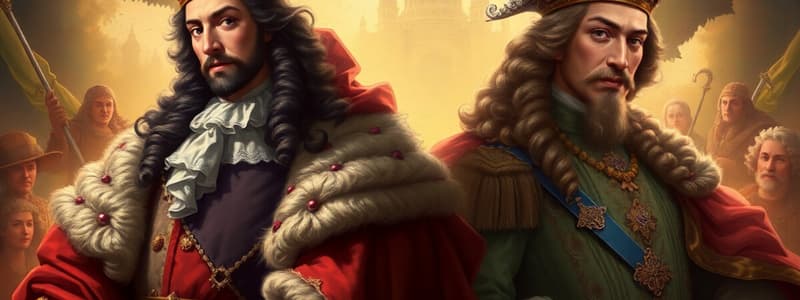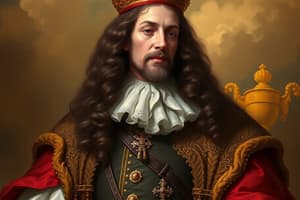Podcast
Questions and Answers
At what age did Louis XIV start to rule France?
At what age did Louis XIV start to rule France?
- 23 years old
- 16 years old
- 21 years old
- 4 years old (correct)
Which of the following statements is true about Louis XVI?
Which of the following statements is true about Louis XVI?
- He called a meeting of the Estates-General after 1614. (correct)
- He never married.
- He lost France's colonies in India and America.
- He was an effective and strong leader.
What significant event led to the downfall of Louis XVI?
What significant event led to the downfall of Louis XVI?
- He was outlived by his father.
- He was beheaded following charges of conspiracy. (correct)
- He was exiled to England.
- He lost a war against England.
What was Louis XV's attitude towards the problems facing France during his reign?
What was Louis XV's attitude towards the problems facing France during his reign?
What happened to Louis XVII during his childhood?
What happened to Louis XVII during his childhood?
What was the main reason for the significant debt left by Louis XIV?
What was the main reason for the significant debt left by Louis XIV?
Which of the following statements regarding the Third Estate is accurate?
Which of the following statements regarding the Third Estate is accurate?
What was Louis XVI's action to address the financial crisis before calling the Estates-General?
What was Louis XVI's action to address the financial crisis before calling the Estates-General?
What was the primary demand of the Third Estate during the Estates-General meeting?
What was the primary demand of the Third Estate during the Estates-General meeting?
Why did the National Assembly take the Tennis Court Oath?
Why did the National Assembly take the Tennis Court Oath?
What initiated the Storming of the Bastille?
What initiated the Storming of the Bastille?
Which group did the clergy belong to in the French Estates system?
Which group did the clergy belong to in the French Estates system?
What was a significant consequence of the financial crisis before the Revolution?
What was a significant consequence of the financial crisis before the Revolution?
How did the Nobility generally feel about the absolute monarchy?
How did the Nobility generally feel about the absolute monarchy?
What was a factor that led to the rising discontent among urban workers?
What was a factor that led to the rising discontent among urban workers?
Flashcards are hidden until you start studying
Study Notes
Louis XIV (1638 - 1715)
- Became king at age 4.
- Took control of France at age 23.
- Cardinal Mazarin controlled France before Louis XIV became king.
- Desired power, fame, and more land.
- Lead three unsuccessful wars.
- Built Palace of Versailles, incurring debt.
- Outlived his son and grandson.
- Ruled France for a total of 72 years.
Louis XV (1715 - 1774)
- Great-grandson of Louis XIV.
- Became king at age 5.
- France was involved in three wars, including the French and Indian War.
- Lost colonies in India and America.
- Indifferent to the problems in France: “After me the deluge”
Louis XVI (1774 - 1792)
- Married to Marie Antoinette.
- Indecisive and easily persuaded.
- Called a meeting of the Estates-General (last called in 1614).
- Found guilty of conspiring with other countries to invade France and was beheaded.
Marie Antoinette
- Austrian princess.
- Married to Louis XVI.
- Beheaded on October 16, 1797.
Louis XVII
- Never became King, but was given the title.
- Imprisoned with his parents at age 7.
- Died at age 10 from tuberculosis.
Louis XVIII (1814 - 1824)
- Younger brother of Louis XVI.
- Lived in exile in England during the revolution.
- Lazy and didn’t want revenge against those who killed his brother.
- Became king after Napoleon's defeat.
French Class Structure
- King had ultimate power over all classes.
- Social mobility was very limited.
- First Estate: Clergy
- Consists of the Roman Catholic clergy.
- Owned 10% of the land.
- Collected tithes and paid no taxes.
- Some were very wealthy, some were poor.
- Provided some social services such as schools, hospitals, and orphanages.
- The Enlightenment criticized this Estate.
- Second Estate: Nobility
- Owned land.
- Had very little money.
- Many hated the absolute monarchy as the middle class was taking their jobs.
- Feared the loss of their traditional privileges, such as not paying taxes.
- Third Estate: Everyone else (97-98% of France)
- Bourgeoisie: Middle class, including bankers, manufacturers, lawyers, journalists, merchants, officials, and doctors.
- Peasants: 9/10 of the population, including landworkers and day laborers.
- City Workers: Including construction workers, industrial workers, apprentices, and street merchants.
France Before The Revolution
- By 1178, France spent half of its budget on paying the interest on the national debt.
- The king spent 25% of the budget on the military.
- 6% of the budget went towards the king’s lifestyle and his court at Versailles.
- A sharp rise in taxes was inevitable.
- Discontent was widespread:
- The best jobs were reserved for nobles.
- Urban workers earned low wages and were heavily taxed.
- The Enlightenment encouraged people to question the ancient regime.
A Financial Crisis
- Louis XIV left France with a huge debt due to deficit spending.
- Causes of debt: Wars, lavish court life, government borrowed money.
- The government tried to solve the crisis by raising taxes and cutting government spending, but these ideas were rejected by the 1st and 2nd estates.
A Crumbling Economy (Late 1780s)
- Bad harvest resulted in higher food prices.
- People were affected by higher food prices and heavy taxes, resulting in peasant riots.
Failure of Reform
- Louis XVI tried to solve the problems by hiring Jacques Necker.
- Necker’s solutions angered the 1st and 2nd Estate resulting in his firing.
- The wealthy and powerful classes demanded that the king call for a meeting of the Estates-General.
- The Estates-General had not been called for 175 years.
Estates-General
- All three Estates were represented at the meeting with the king.
- The king had the three Estates prepare cahiers (notebooks) outlining their grievances.
- Common grievances:
- Fairer taxes
- Freedom of the press
- Regular meetings of the Estates-General
- The 3rd Estate was represented by men who owned property, including lawyers, writers, and officials.
- Representatives from each estate failed to resolve their differences over how to vote.
- The 1st & 2nd Estates wanted to meet separately and vote as a single estate.
- The 3rd Estate wanted each person to have a separate vote.
- The 2nd Estate left in protest and formed the National Assembly.
The Tennis Court Oath
- The National Assembly wanted to write a constitution.
- The king locked them out of their meeting place.
- The National Assembly met in a nearby tennis court, where they took an oath to continue meeting until a new constitution was established.
The National Assembly
- Some clergy and nobles joined the National Assembly.
- King Louis XVI did not like the National Assembly and ordered troops to surround Versailles and Paris.
- People feared the National Assembly would be dissolved by the king.
Storming of the Bastille
- Parisians were scared that troops would surround Paris.
- 800 Parisians assembled outside the Bastille seeking weapons and gunpowder.
- The commander of the Bastille refused to open the gates and fired on the crowd.
- The crowd broke through the defenses, killed the commander and five guards, and released seven prisoners.
Studying That Suits You
Use AI to generate personalized quizzes and flashcards to suit your learning preferences.




